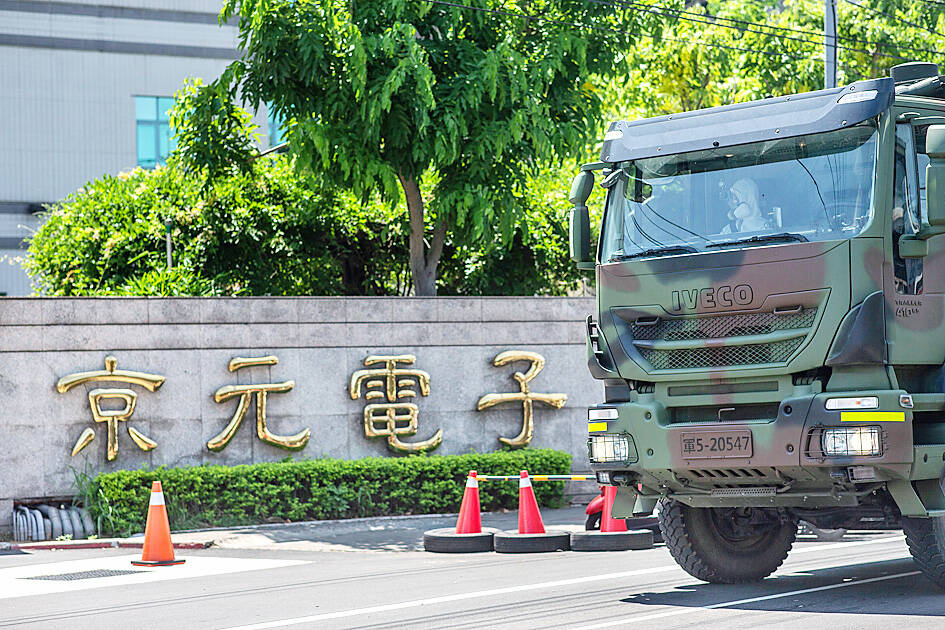King Yuan Electronics Co (京元電子) has purchased facilities and equipment from Xuan Tong System Integration Co (玄通系統工程) for NT$1.05 billion (US$32.9 million) as the company seeks to expand its IC testing capacity, it said on Friday.
The company has also spent just less than NT$500 million to acquire 15 land parcels in Miaoli County’s Jhunan Township (竹南) totaling 22,372.06 square meters for future business needs, it said in a filing with the Taiwan Stock Exchange.
The deals come as King Yuan is expanding its artificial intelligence (AI) chip testing capacity at its plant in Miaoli’s Tongluo Township (銅鑼) to meet the needs of Nvidia Corp and other customers.

Photo courtesy of the Military News Agency via CNA
Founded in 1987, King Yuan provides front-end wafer testing and back-end IC product testing services, as well as burn-in and packaging services.
The company operates plants in Tongluo and Jhunan townships in Miaoli County and Suzhou, China.
King Yuan’s specialty is in providing customized test solutions for customers, which include Nvidia, MediaTek Inc (聯發科), Broadcom Inc and Marvell Technology Group Ltd.
For this reason, the company uses a self-made tester to test mixed-signal, power management, radio frequency and other chip modules, and has further expanded to high-speed test modules, such as MEMS sensors and CMOS modules.
The company also said on Friday that it has raised its Chinese subsidiary King Long Technology (Suzhou) Ltd’s (京隆科技) capital expenditure to 1.392 billion yuan from 738 million yuan (US$196.2 million from US$104 million), an increase of 88.5 percent, as it prepares for operational and capacity expansion needs.
The move follows the company’s decision to increase its capital expenditure in Taiwan this year to NT$13.8 billion from NT$12.3 billion, of which 40 percent would be used to construct cleanrooms and plants in Tongluo and Jhunan, while the remaining 60 percent would be used for testing equipment procurement and machine upgrades.
In the first half of this year, King Yuan reported revenue of NT$12.52 billion, up 9.73 percent from NT$11.41 billion in the same period a year earlier, while net profit rose 19.69 percent to NT$3.27 billion from NT$2.73 billion, with earnings per share of NT$2.68.
The company expects revenue to grow 5 percent to 7 percent this quarter from NT$6.54 billion last quarter.
It also expects an increase of at least 10 percent in full-year revenue this year given stronger-than-expected AI demand, it said.
Gross margin this year is also expected to continue expanding amid rising factory use after posting 34.18 percent in the first half of this year, it added.

SEEKING CLARITY: Washington should not adopt measures that create uncertainties for ‘existing semiconductor investments,’ TSMC said referring to its US$165 billion in the US Taiwan Semiconductor Manufacturing Co (TSMC, 台積電) told the US that any future tariffs on Taiwanese semiconductors could reduce demand for chips and derail its pledge to increase its investment in Arizona. “New import restrictions could jeopardize current US leadership in the competitive technology industry and create uncertainties for many committed semiconductor capital projects in the US, including TSMC Arizona’s significant investment plan in Phoenix,” the chipmaker wrote in a letter to the US Department of Commerce. TSMC issued the warning in response to a solicitation for comments by the department on a possible tariff on semiconductor imports by US President Donald Trump’s

The government has launched a three-pronged strategy to attract local and international talent, aiming to position Taiwan as a new global hub following Nvidia Corp’s announcement that it has chosen Taipei as the site of its Taiwan headquarters. Nvidia cofounder and CEO Jensen Huang (黃仁勳) on Monday last week announced during his keynote speech at the Computex trade show in Taipei that the Nvidia Constellation, the company’s planned Taiwan headquarters, would be located in the Beitou-Shilin Technology Park (北投士林科技園區) in Taipei. Huang’s decision to establish a base in Taiwan is “primarily due to Taiwan’s talent pool and its strength in the semiconductor

An earnings report from semiconductor giant and artificial intelligence (AI) bellwether Nvidia Corp takes center stage for Wall Street this week, as stocks hit a speed bump of worries over US federal deficits driving up Treasury yields. US equities pulled back last week after a torrid rally, as investors turned their attention to tax and spending legislation poised to swell the US government’s US$36 trillion in debt. Long-dated US Treasury yields rose amid the fiscal worries, with the 30-year yield topping 5 percent and hitting its highest level since late 2023. Stocks were dealt another blow on Friday when US President Donald

UNCERTAINTY: Investors remain worried that trade negotiations with Washington could go poorly, given Trump’s inconsistency on tariffs in his second term, experts said The consumer confidence index this month fell for a ninth consecutive month to its lowest level in 13 months, as global trade uncertainties and tariff risks cloud Taiwan’s economic outlook, a survey released yesterday by National Central University found. The biggest decline came from the timing for stock investments, which plunged 11.82 points to 26.82, underscoring bleak investor confidence, it said. “Although the TAIEX reclaimed the 21,000-point mark after the US and China agreed to bury the hatchet for 90 days, investors remain worried that the situation would turn sour later,” said Dachrahn Wu (吳大任), director of the university’s Research Center for